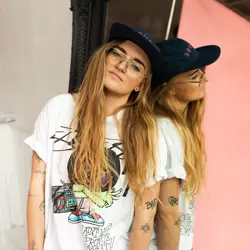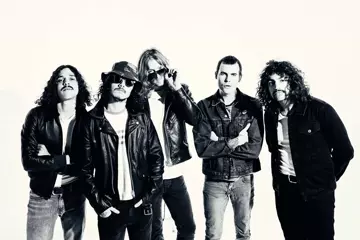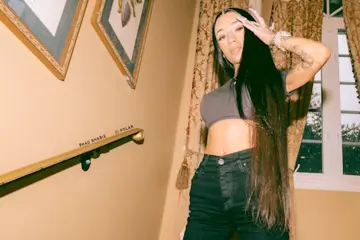 G Flip
G FlipThe music industry is always in a state of flux, molding to new trends and adapting to shifts in the broader cultural zeitgeist. This is nothing new; it’s been how the industry has worked since it started more than a century ago – hell, it’s how every industry works. But over the past decade in particular, we’ve seen a monumental evolution in how the music industry has welcomed, embraced and championed queer voices – especially here in Australia.
It wasn’t long ago that “queer music” was relegated to the underground. When I started going to shows regularly at 17 – incidentally, ten years ago – the majority of those spotlighting queer and trans artists were community-run, put together on shoestring budgets by the artists themselves and held in bookstores and record shops (as a fledging Western Sydney queer, Black Wire Records will always hold a special place in my heart). That isn’t to say queer artists weren’t succeeding in the mainstream – this was right around the time we saw the likes of Courtney Barnett, Tash Sultana and Alex Lahey catching their big breaks – but if you wanted to see artists boldly embodying their queerness and wearing it on their sleeves, you had to put some effort into seeking them out.
Part of the reason today’s Aussie rock, pop and indie scenes have such a bright sheen of queerness to them is the perseverance of bands who cut their teeth in those underground scenes. Cry Club started out playing house shows, and just finished a raucous national tour with Regurgitator. Private Function and Orpheus Omega, two bands with trans women in prominent roles, have evolved from dive bar darlings to leaders in their respective genres (punk and death metal) – hell, the former crew even cracked the ARIA Top Ten with their second album, Whose Line Is It Anyway? Camp Cope, too, spent their (far too short) career loudly advocating for LGBTQ+ rights and visibility, going as far as to have screens behind them at sold-out theatre shows read “TRANS RIGHTS ARE HUMAN RIGHTS”.
Another prime example is Melbourne (Naarm) post-punk unit RVG – the trans experience of whose frontwoman, Romy Vager, drives some of their hardest-hitting songs (ie. Alexandra, Eggshell World). The band started humbly in the latter half of the 2010s, playing their first shows to crowds of tens and even minting their debut album (2017’s A Quality Of Mercy) completely DIY, with no budget, tracking live over the span of a single weekend in the green room of a pub. Nowadays they’re selling out theatres on massive tours – not only in Australia, but Europe and the UK as well. They won the 2023 Australian Music Prize with their career-defining third album, Brain Worms.
Don't miss a beat with our FREE daily newsletter
All of this pales in comparison to the way queer artists have dominated the Australian pop landscape. One of its all-time biggest exports is Troye Sivan, who made incredible waves throughout the 2010s as a gay teen pop star who was loud and proud about his identity, defiantly using his platform to give young queer people a voice. He’s only gotten bolder with age, too – look no further than his sexually charged third album, Something To Give Each Other (which arrived last October, promptly topped the ARIA Charts and earned Sivan a suite of accolades). In a similar league are Cub Sport, who also scored their first #1 with an album they released last year (their fifth full-length effort, Jesus At The Gay Bar).
Then, of course, there’s G Flip, the single most successful non-binary artist Australia has ever produced. In 2023 alone they topped the charts with their second album DRUMMER, collaborated with Linkin Park legend Mike Shinoda, performed on national TV at least three times (for Take 5, Christmas With Delta and the AFL Women’s Grand Final), presented at the ARIA Awards (where they also earned six nominations and won two), embarked on their biggest-ever headline tour, and broke the record for the most songs by a single artist in a triple j Hottest 100 (with seven).
Australia has unequivocally embraced G Flip as a modern-day icon, and that hasn’t come at the expense of their identity – Flip theirself has long been unapologetically vocal about their identity (as both a non-binary person and a lesbian) and has celebrated it gallantly on songs like Queen, Gay 4 Me and Be Your Man.
In cover story for TheMusic.com.au, G Flip opened up about how it feels to be perceived as a role model for young queer and non-binary people, declaring they’d “always been game” to offer such historic representation. “I’m so proud to be a part of this community,” they gushed. “It’s been really amazing to meet so many gender non-conforming, genderfluid, non-binary and trans people over this journey, and getting to connect with them and hear their stories... As much as I’ve been able to inspire others, this has been really inspiring to me, and it's helped me feel confident in myself as a proud non-binary person.”
Peach PRC is well on her way to achieving similar success as a household name. First blowing up as one of the biggest Australian creators on TikTok, last year saw the bubblegum pop artist (who tongue-in-cheekily wears the “lesbian singer” tag like a badge of honour) launch her debut EP, Manic Dream Pixie, to yet another ARIA #1 – she also performed at the 2023 ARIA Awards (where she earned three nominations) and co-headlined the inaugural edition of Sydney WorldPride (alongside MUNA, Kim Petras and G Flip).
Peach came out as lesbian in January 2022 – but long before then, she’d been staunch on celebrating queerness in all its forms. In an NME interview, she declared coming out to be “the best thing [she's] done”, saying of her own status as a modern queer icon: “It’s a privilege to be out and proud, and to be loudly queer, and make openly queer music, and have people listen to it.” Since then, Peach's songwriting has fearlessly channelled her queer identity – Like A Girl Does and Secret are two sexually charged sapphic anthems, released back-to-back last November and this February, respectively – setting her up as something along the lines of Australia’s answer to Chappell Roan.
Speaking of which, I’d be remiss not to mention the influence of non-Australian artists, since overseas trends do tend to dictate what will be popular here. Roan’s mainstream explosion has well and truly spread Down Under – her extremely gay debut album, The Rise And Fall Of A Midwest Princess, has consistently risen up the charts every week for the past six (currently sitting at #14). The current #1 album in the country is Hit Me Hard And Soft by Billie Eilish, a record drenched in overtly sapphic themes (if there’s a heterosexual way to interpret Lunch, I’m certainly yet to find it). And last February, Sam Smith became the first openly non-binary artist to debut at #1 in Australia.
All these major pop successes point to a bright future for the Aussie queer artists on the cusps of their own mainstream breakthroughs. Indie-pop trio Egoism are currently putting the finishing touches on their debut album, which will undoubtedly be a hit with the triple j audience. Synthpop duo RAAVE TAPES just dropped their own self-titled debut, a moreish set of buoyant pop bangers destined to send their stardom soaring. Indie wunderkind Flowerkid is also prepping an album, and with major label backing from Warner Music, we’re expecting it to be a smash-hit. And we’ve already begun to see Forest Claudette make their well-earned rise to the top, kickstarted last June with their hypnotic Everything Was Green EP and boosted last month by its follow-up, Jupiter.
Of course, the panoptic culture of Australian music isn’t just defined by the biggest names in the industry. There are dozens of other queer artists whose successes have been instrumental in shaping the scene as we know it today. Among them is Alex The Astronaut, who has been lauded by national treasures like Paul Kelly and Lindy Morrison, and is well on track to carve out an idiosyncratic legacy of her own. Alex’s heartrending folk-pop gem Not Worth Hiding, about learning to accept and embrace one’s own queerness, became an unofficial anthem for the ‘Yes’ campaign in the 2017 same-sex marriage plebiscite.
Back in 2022 – around the time they released their second album, How To Grow A Sunflower Underwater – Alex (who uses she/they pronouns) opened up about their unique experience with gender. They haven’t outright identified as non-binary (publicly, at least), but as they sang on the album’s closer Haircut, they’re “not a boy or a girl” and they're contentedly experimenting with that side of their identity. Should she eventually find that ‘non-binary’ suits her, Alex will be in good company: more enbies crushing it in the Australian pop and indie circles include Jen Cloher, Mo’ju, Kee’ahn, St. South, Enola, Robert Baxter, Lupa J, Hallie, FVNERAL's Tim Blunt, Wolfjay and Montaigne.
Montaigne is actually another artist worth highlighting, since they were the first openly queer artist to represent Australia at the Eurovision Song Contest. They blazed right through to the first semi-final at Eurovision 2021, and set a trend for years to follow: the openly gay Sheldon Riley repped Australia for Eurovision 2022, and the fantastically queer Electric Fields did us proud at Eurovision 2024. The obvious takeaway here? Well since the idea of Eurovision is to showcase the best pop music from each competing country, and three of the last four acts picked to rep Australia were queer, it’s safe to conclude that Australia’s best pop music is made by queer people. That’s just science, baby!
Moving on from pop, I want to segue back to rock for a second. When I think about the best up-and-coming rock bands in Australia right now – and those that fit the broader realms of alternative, punk and otherwise “heavy” – the overwhelming majority feature at least one queer member: there’s Teenage Joans and Teen Jesus And The Jean Teasers, VOIID, Moaning Lisa, Platonic Sex, The Beautiful Monument, Stand Atlantic, Totty, The Buoys, Those Who Dream, The Last Martyr, Porpoise Spit, Cherish, The Empty Threats...
That’s not even mentioning solo artists – bring them into the equation and there’s also Ruby Fields, Hope D, Suzi, Eaglemont, Bec Stevens, Noctica, Peni Parker... If I don’t stop now, I’ll go on for paragraphs.
Even in the world of country music – a genre with an accompanying culture infamous for its societal conservatism – there are queer icons to celebrate. Take for example Beccy Cole, who was ostensibly the first mainstream Australian country artist to come out when she did in 2012 – or Michael Waugh, who followed suit some ten years later when he came out at the 2022 Golden Guitar Awards. Just last week, actually, Waugh released his soul-baring fifth album, Beauty & Truth, which he candidly noted to Countrytown is “a record about being proud to be gay”.
Cole and Waugh have paved the way for dozens of younger country artists to own their queerness, with some of our local favourites making waves including Melody Moko, Cat Canteri, Hussy Hicks, Kerryn Fields, Charlotte Le Lievre, Leroy Macqueen, Rae Leigh, Justin Standley and Logan Hoswell.
Another genre with some hangups around queerphobia is hip-hop. But even that scene is going through a yassified paradigm shift, again thanks in no short part to the influence of prominent queer artists overseas (ie. Lil Nas X, Kevin Abstract, Lil Uzi Vert). Australia’s underground hip-hop scene is especially teeming with trans and non-binary talent, invigorated by promising names like Jesswar, Kaiit, Dylan Atlantis, LILPIXIE, Sidney Phillips, Reuben Johnson, Jamaica Moana and Julai.
It’s not enough for all of these artists to simply exist – they need to be platformed and championed by the Australian music industry at large. And thankfully, over the last few years in particular, they have been. On the radio, triple j has consistently proved itself eager to give young queer artists an opportunity to shine. Apple Music and Spotify both have several editorial playlists dedicated to queer music (my favourite on the former service is Queer Australia, and Spotify’s GLOW hub is also fantastic).
Mainstream festival lineups are getting queerer every year – take for example Laneway, which had queer artists billed as headliners for both its 2023 (Phoebe Bridgers) and 2024 (Steve Lacy and Dominic Fike) editions. Then there’s the surging mainstream popularity of events like Mardi Gras in Sydney (Eora) and Midsumma in Melbourne (as well as Gaytimes and ChillOut in regional Victoria). And in terms of smaller events, dope parties are always being thrown by Heaps Gay, and BONEZ has become a staple of the alternative scene.
Also hoping to boost trans and non-binary rep in Australian music is TRANSGENRE, a grassroots initiative led by myself (a proud trans woman) and the aforementioned Tim Blunt of FVNERAL (who is non-binary). We launched towards the end of 2023 with a music festival in Sydney, which despite being run with no marketing or PR budget, ended up being completely sold out in advance. We recently started using our social media pages to platform feature artists and share weekly gig roundups, and we’re currently planning the second edition of the festival for early 2025 (as well as a few more lowkey shows).
All of this is to say that now is a pretty great time to be a queer music lover in Australia. There are hundreds of amazing artists representing the LGBTQ+ community on the radio, at festivals, in magazines and beyond – there are so many I had to leave out of this article, too, because otherwise it’d be more like a book (I didn’t even get to touch on Australia’s insane hyperpop scene). There will always be work to do in ensuring that rep is fair and affirmative, and it will always be important to advocate for more – and celebrate it when we see it. But that’s true for any marginalised community: we do all that we can, and we revel in all that we do.
For now, at least, the future of Australian music is looking bright – and queer as hell.

















